#FINALLY done with this!
Text
Gif Pack: Natalia Dyer
By accessing the payhip linked below, you will find +344 gifs of Natalia Dyer as Billie Fletcher in the movie All Fun and Games (2023). All of these gifs were made by me. The gif pack is availble through payhip for free (or pay what you want). These gifs were made for roleplay usage. The sizes of the gifs are all 268px in width and 150px in height (268x150). All of them are below 4.0 MB. My other gif packs of Natalia can be found here. While not necessary, a quick like or reblog if you found these gifs helpful would be appreciated!
Gif Pack Features: Laurel Marsden, Kolton Stewart, Asa Butterfield, Benjamin Evan Ainsworth
Trigger/Content Warnings: Drinking, Kissing, Fire, Jump Scared, Flickering Lights, Weapons (knives, bat), Being Held Down, Black Blood, Possessed Demon Kid, Being Pushed Against A Wall, Fighting/Struggling
Important Note: Do not repost or redistribute my gifs, claim my gifs as your own, remove my watermarks, repost my gifs in a gif hunt (link to my gif pack instead), or use my gifs to make crackship gifs. You may crop my gifs for personal use only after asking for my permission first.

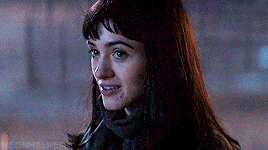
► GIF PAGE & DOWNLOAD ◄
#natalia dyer gif pack#gifpacknetwork#natalia dyer gifs#gifpackhqs#natalia dyer gif hunt#gifsociety#rph#gif pack#natalia dyer#*#supportcontentcreators#finally done with this!
131 notes
·
View notes
Text
The Resistance Interview [STYLE Series #004 - Muse (August 2010)]
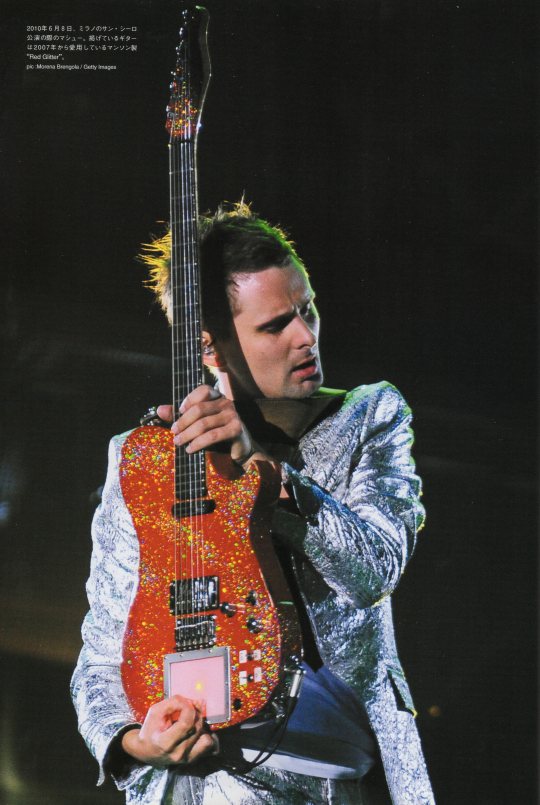
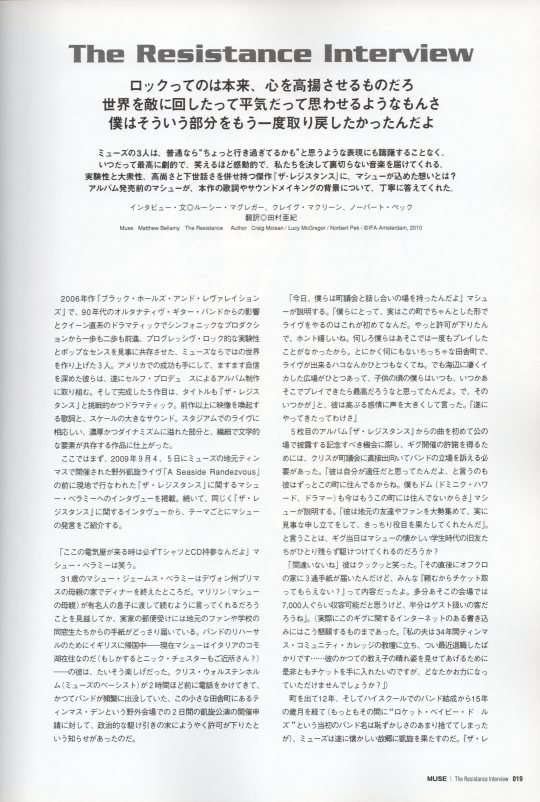
Rock is supposed to be uplifting.
It's the kind of thing that makes you feel okay about taking on the world, and I wanted to get that part of me back.
The three members of Muse have never hesitated to take their music to a level of expression that would normally be considered “a little too far,” and have always delivered music that is supremely dramatic, hilariously moving, and never betrays us. What is Matthew's intention for “The Resistance,” a masterpiece that combines the experimental and the popular, the highbrow and the vulgar? Before the album's release, Matthew carefully answered our questions about the background of the lyrics and sound-making of the album.
Muse - Matthew Bellamy - The Resistance / Author: Craig Mclean/ Lucy McGregor / Norbert Pek / ©IFA-Amsterdam, 2010
Translation by Aki Tamura
With their 2006 album “Black Holes and Revelations,” the three members of Muse took a step or two forward from the influences of 90's alternative guitar bands and the dramatic, symphonic production of Queen, and created a unique world where progressive rock experimentation and pop sensibilities coexist beautifully. The three members have created a world that only Muse can create. With their success in the U.S., they became more and more confident and finally started to work on a self-produced album. The fifth album they completed, titled “The Resistance,” is both challenging and dramatic. The lyrics evoke images even more than the previous album, and the sound is larger in scale. The result is a work that combines the richness and dynamism of a stadium live performance with the subtlety and literacy of a literary element.
Here is an interview with Matthew Bellamy about “The Resistance” conducted prior to “A Seaside Rendezvous,” Muse's triumphant outdoor show held on September 4th and 5th, 2009, in their hometown of Teignmouth. The following are Matthew's remarks by theme from the same interview about “The Resistance”.
Matthew Bellamy laughs, “Whenever the electrician here comes over, he always brings a T-shirt and a CD.”
31-year old Matthew James Bellamy has just finished dinner at his mother's house in Plymouth, Devon. The mailbox at his parents' house is full of letters from local fans and school alumni in anticipation of Marilyn (Matthew's mother) telling her celebrity son to give it to him to read. Matthew is back in England for band rehearsals and currently resides in Lake Como, Italy (perhaps Nick Chester is a neighbor?) — he was very happy to be there. Chris Wolstenholme (bassist for Muse) had called about two hours earlier to inform him that after some political wrangling, permission had finally been granted for a two-day triumphant return to the Teignmouth Den, an outdoor venue in this small country town where the band used to frequent. The news was good.
“We had a meeting with the town council today,” Matthew explains. “This is the first time we've ever done a proper show in town. We're very happy to finally get permission to do this. We've never played there before. It's a tiny little town in the middle of nowhere, with not a single venue for a live show. But there was a really cool square by the beach, and as kids we always thought it would be great to play there someday. And that someday is finally here,” he said, his voice rising with emotion.
In order to get permission for the gig, Chris had to go directly to the town council to make the case for the band's position on the occasion of the first public performance of songs from their fifth album, "The Resistance."
"He thought he was the right person for the job, because he's lived here all his life, and neither I nor Dom (Dominic Howard, drummer) live here anymore," Matthew explains. "He did a great job of getting a lot of his local friends and fans together, and he did a really good job of making the case." Does that mean that every single one of Matthew's nostalgic old school friends will be there on the day of the gig?
"No doubt about it," he chuckled. "Shortly after that, three letters arrived at my mum's house, all saying, “Please, can you get us tickets?” I think the venue there can accommodate about 7,000 people, but I guess half of them will be treated as guests." (In fact, one Internet post about the gig even pleaded, “My husband taught at Teignmouth Community College for 34 years and just recently retired…. I would love to get us tickets so that he can see his former students in their finest hour of glory. Could someone please help me?")
Twelve years after leaving town, and fifteen years after forming the band in high school (although the original band name, “Rocket Baby Dolls,” has been abandoned out of embarrassment in the meantime), Muse is finally making a triumphant return to their old hometown. "The Resistance" is arguably the band's most ambitious work to date, and that's saying a lot for a band whose sound is a blend of arena-style rock anthems, epic space rock, and grand futuristic sensibilities.
Some have mocked the band's emphasis on showmanship over songwriting, and have criticized Muse as stuck in a time warp. But fans and most critics agree that they are currently the best live act in the world.
“We've always been interested in the polarity of things. We like to go back and forth between the two extremes. It's a roller coaster journey full of peaks and valleys.”
The mix of classical and progressive hit patterns and uplifting riffs is simply irresistible fun. Recorded for the first time in the band's own studio in Italy without any help from a producer, The Resistance opens with its first single, “Uprising”. Matthew sings of his love of conspiracy theories — "They'll try to, push drugs that keep us all dumbed down/And hope that we will never see the truth around" as his voice chants "Hey!" like a football field chant on every snare. It's the same kind of love that drives the album's title track (“Love is our resistance/They'll keep us apart and they won't stop breaking us down”) and the 80s pop-tinged of “Undisclosed Desires” (“I want to reconcile the violence in your heart”), is a familiar theme in Muse's songs. The glam guitar solo of “MK Ultra” is followed by the smooth piano pop of “I Belong to You (+Mon cœur s'ouvre à ta voix)” (the latter part of the title is a reference from the opera “Samson and Delilah”). With a romantic piano accompaniment, Matt sings sweetly, “I can't find the words to say/When I'm confused/I've traveled half the world to say /"You are my muse"”…… The song then builds to an epic, choir-driven musical climax. Even more surprisingly, “United States of Eurasia,” reminiscent of Queen's rock opera, rivals “Knights of Cydonia” in terms of sheer scale.
—In “The Resistance,” there is a frequent contrast between “us” and “them.” For example, in “Uprising,” you sing, “They will not force us/They will stop degrading us/They will not control us/We will be victorious.” As a rather wealthy and socially successful young man, who is “us” and who is “them”?
Matthew: (laughs) The first one especially, that's a real “us” and “them” song.
—I know you like well-made conspiracy suspense stuff…….
Matthew: Yeah, I love all that stuff. But the funny thing is, there are much more gruesome things going on in the real world these days than that stuff. Like the whole damn banks and MPs thing (supposedly alluding to the big scandal that has recently come to light in the UK (2009) where several MPs have been charged for obscure expenses). There is a level of depravity and corruption going on in our government and in our banks that the average citizen would find hard to believe. These two institutions are supposed to be serving us, but it turns out that they have been ripping us off with impunity. This is not a fantasy, this is a very real event, it is not a conspiracy or anything like that. Oh, in a way, I'm expressing my vague disappointment here. The moment I realized that corruption still exists. Maybe that's “them” and “us” is everyone else who has to pay for it.
—Now, are you satisfied with the quality of “The Resistance”?
Matthew: Pretty good, yeah. I think we hit the nail on the head with this album. We took a bit of a gamble. We did some things we've never done before. We weren't sure how it would be received, but it seems that most people like it. The order of the songs on this album is pretty much in the same order as we recorded them.
—I was just about to check that out. I mean, the progression of the album is like the unfolding of a movie. There's a lot of action, and then it converges into a big circle. I don't think it's strictly a concept album, but did you have a concept behind the whole thing?
Matthew: Yeah, I had some ideas. I had the opportunity to re-read "1984" (George Orwell's novel), and I think everyone knows the content of that book, but this time I wanted to take a look at the background behind the so-called political unrest and problematic elements in that book. I was really drawn to the romantic tragedy part of it. I wanted to give the same kind of feeling to "The Resistance," but with a modern political context.
"Uprising" incorporates many events that are currently happening around the world. We recorded the song as we were writing it. As you can hear when you listen to it, we're picking up right where we left off musically with the rhythmic chants of "we're all working together against them" kind of thing. The first two songs on the album are probably what people expect from us. But from there, the album starts to get weirder and weirder.
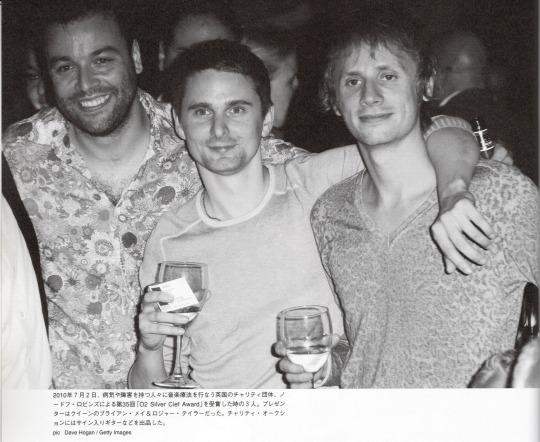
Picture: The three members at the 35th annual O2 Silver Clef Award presented by Nordoff Robbins, a British charity that provides music therapy to people with illnesses and disabilities, on July 2, 2010. Presenters were Brian May & Roger Taylor of Queen. The charity auction included signed guitars.
pic: Dave Hogan/Getty Images
—Perhaps new listeners will respond more directly to the second half of the album. Did you intend to be clear about how you wanted to start and end the album?
Matthew: We have always been a band interested in the polarities of things. For example, one person might be singing, and then all of a sudden everyone is singing. It's like a raw solo voice and then all of a sudden it switches to a loud choir……. Something very subtle to very loud, or something loud and flashy to very restrained and subtle all at once. We always like to move back and forth between these extremes, and we are attracted to that kind of thing. Why we are attracted to such things is still a mystery to me. It's like a roller coaster ride of peaks and valleys, where you get your hopes up and then you get dropped with a thud, and so on and so forth. But I think the ending of the album is quite interesting. It's a quiet, understated ending.
—It's different from your usual approach, isn't it?
Matthew: No, it's not.
—You will be making your triumphant return to your hometown in a short time, and you already have tour dates lined up for the rest of the year?
Matthew: Yeah, it's a tight schedule through the summer. It starts with a gig in Plymouth, then a gig in my hometown, and it goes on and on from there. Most of them are short TV stuff, like the one we just did in the US for MTV. Then we'll do a few in Berlin and Paris as a meet and greet. But the real tour will be with U2. We're going to tour the U.S. with them for a couple of weeks. It's going to be interesting (laughs). Our main tour will start after that. The U2 tour will be a warm-up for us to get back in gear and also to see their shows up close and see how they do it…….
—Do you mean "The Claw" (as U2's ‘360° Tour’ set is nicknamed is a huge steel structure that looks like a claw. It's a four-legged set of steel claw-like frames, 40-60 meters high)?
Matthew: “The Claw”, yes, I'm looking forward to seeing that. Our tour will start after that and last until December. We are hoping to play the Big Day Out (an outdoor festival in Australia) if possible.
—Tell us about “United States of Eurasia”. It has a cool Queen-style break and strings that remind me of Led Zeppelin's “Kashmir,” with Muse's signature subtle touch. What criteria do you use to decide if you want to go too far or not? What is “too much” for Muse?
Matthew: We are very self conscious as to whether or not we have gone too far. The song “The only one!” (the part of the multi-track with the “Bohemian Rhapsody”-style vocals) can be found at …… I think anyone can't help but pump their fist in the air in a Freddie Mercury pose when they sing that one (laughs). But when we were working in the studio, we were totally aware of that. We thought, "Let's look back at what we've done with the past albums." Not that this is the case with all of our albums, but we've tried a few times in the past to keep the flow from going too melodramatic or extreme. It happened once.
—Really? Because I think Muse has always been melodramatic enough (laughs).
Matthew: For this album, we produced it ourselves, so there was no one telling us what to do. So we thought, “Why not? We should have fun and laugh our hearts out!"And that's what we did, and that's how it turned out.
—I'm wondering if your theatrical side is well received in the U.S.A.? To be honest, I have the impression that Muse's popularity there has so far not reached the same level as in the UK, etc……. Is that situation changing already? Are big mouths working to your advantage, or is it the other way around?
Matthew: Well, I would say that the tables have turned now. Apparently, people in the U.S. like that stuff more than people in the U.K. In the U.K., there is a kind of saturation of rock music with those elements. Queen, Led Zeppelin, The Beatles, etc., have a history of that kind of thing. But I don't think people are sick of it. They're much more interested in what's going on right now.
Whereas in the U.S., and maybe even in Australia, that aspect of music exists more as something to be genuinely enjoyed. It's an element that has been missing from rock music in the past 5 or 10 years. The music of the 90's took itself too seriously and became very serious, and sometimes lost all interest. I don't think there's anything wrong with that, but I don't want to forget that rock music is supposed to be fun. Rock music is supposed to be uplifting. It makes you feel like you can take on the world. I wanted to bring that back.
—Another unprecedented change in “The Resistance” is the very frankness of your feelings, especially in the latter half of the album. Is the song “Undisclosed Desires” a direct reflection of your relationship with your girlfriend? You've never written a song that was so public about your private life, have you?
Matthew: Yeah, that's something that I've been wondering about for a long time. Personally, I don't like songwriters who bring their “domestic life” into their songs. I get bored listening to them. That song is certainly …… Well, it's not totally domestic, but there's a lot of personal stuff in it.
I think that's one of the things I'm testing myself on. I don't know if I'm really ready to bring that kind of element to Muse... But on the other hand, publicly revealing what's going on with my family, my best friend, or my girlfriend in a way that is clearly recognizable is not what I want to do. Of course, I'm sure those things are in the songs, but I try to put them in a different cloak so that they're not obvious at first glance. Sometimes I make them more graphic than they really are, and sometimes I put a melodramatic spin on them, depending on how I use pronouns. Conversely, depending on the context in which it is placed, it is possible to tell a more open story about oneself. Sometimes I really let it all hang out in the lyrics. In the end, you have to cut out your true feelings. It's a strange contradiction, a strange paradox. If I say, “This is a story about me and my girlfriend,” then of course I'm limited in what I can say. But if I put myself in a different scenario, for example, on this album, I can use the dramatic political backdrop to create a romance…… With that kind of setting, I can explore a lot of ideas without having to be so honest.
"Up until now, we had been holding back the flow to prevent it from going too melodramatic."
—To be honest, how well do you think your fans know you? Do you feel any familiarity with them?
Matthew: Well, when I think back to when I used to listen to records and go to concerts of various bands, I feel a certain closeness to the bands I follow because I feel like I'm in direct contact with their thoughts and feelings. It's an extraordinary experience for the fans. We throw a lot of stuff at them on stage. Our fans probably know a little bit about me, and maybe that makes them feel like they know me better than someone in my family, and maybe they feel closer to me. But having said that, my family knows a completely different side of me than they do. There are many sides to people, aren't there? I think that when you put that kind of multifaceted humanity into music, you feel an undeniable connection between the sender and the receiver. I feel that when I play. I feel very close to the people who are watching me. I feel great that they are there to see me, and I feel great that they are seeing what we are expressing, which can only be experienced in that moment, in that place. It's really great.
—You performed with an orchestra in the three-part symphony “Exogenesis.” What was it like to hear a song you wrote played in that way?
Matthew: I was surprised and extremely nervous (laughs). I thought, "They're going to laugh, they're going to think it's so cheesy and rudimentary." Because they usually spend their time playing masterpieces by really great composers. But it turned out very well, and I really enjoyed the recording process from start to finish. I had the opportunity to work with the entire orchestra, and finally made some last-minute changes to the score to get a better idea of what they were capable of. It was a great experience. It was amazing to hear my own compositions played by so many people. It was an experience like nothing else.
“I re-read 1984 shortly before we started work on the album. I wanted to do something that was more relevant to our time, not something based on a dream.”
—Now, I'm very interested in how you will reproduce the songs from this album live. Maybe with an orchestra in the background?
Matthew: I was seriously thinking about doing a live show. But just last week we started rehearsing and realized that Dom, Chris, and I could do our parts surprisingly easily. We have a fourth member who plays with us, Morgan (Nicholls), who plays synthesizer, keyboards, and piano parts as needed. We basically just leave it to him and say, “Take care of this!" So he is in a panic even as I speak, because he has to play all those symphony parts on the keyboards, hahaha. Well, I will probably have to use more samples and electronics than before, but I'd rather play a live version than just reproduce the studio version as is. However, I still don't know if I will play “Exogenesis” live or not, or if I will include it in my regular set. Maybe only at festivals. We want to add a little fun to the show.
[About the lyrics.]
—What kind of work did you have in mind for “The Resistance”?
Matthew: I had read “1984” once when I was a teenager (Editor's note: A novel by British author George Orwell published in 1949. In Japan, a new translation of “1984” by Kazuhisa Takahashi was published by Hayakawa epi Bunko in 2009 and attracted a great deal of attention.), but at the time it didn't leave me with any particular impression. I happened to have a chance to read it again shortly before I started working on this album. I was watching all the news that was going on in the world right now, such as the economic crisis, the banking crisis, and the embezzlement scandal of a member of the House of Commons (in the U.K.)……. I wanted to make an album that was more closely related to the reality of the times we are living in, and not something based on a dream.
—In the lyrics of “Uprising”, you use the word “they” frequently. For example, there is a line “they want to control us,” but who are these “they”?
Matthew: People who listen to the album can interpret the meaning however they like. I know who “they” are in “Uprising,” but the interesting thing is that it can be very different depending on the situation. For example, if you are in the resistance, you may feel that the police are trying to forcefully suppress you. Then “they” would be the police. Or perhaps the protagonist lives in China, where freedom is being taken away by a communist regime. Well, that could be any government. But what strikes me as particularly strong is what is called “corporate fundamentalism.” In other words, the industrial system that rules the world. Power is concentrated in the hands of a handful of large corporations, maybe even the magazine you are writing about is owned by one of them. They own TV stations, and sometimes they control all the natural resources of an entire country. They are so powerful, sometimes more powerful than the government. When I say "they", I mean those people. They are the ones who create economic crises.
—In “The Resistance,” you sound as if you're scared of something. You say you are concerned about whether your secret is safe and that you can't trust anyone.
Matthew: I definitely have paranoid schizophrenic tendencies. But anyway, I saw on the news that there is a big scandal in the UK about government spending, and there is a movement against government policy. People have decided not to support the current government anymore. There are wars going on all over the place, and most English people want nothing to do with them. I began to think that this whole situation could be the subject of an album, so I started doing some research. First, I went back to 1984. I was very impressed with the love story in that book. It's a very tragic story. The lyrics of "The Resistance" were very much inspired by the love story in "1984".
—The album closes with the three-part symphony “Exogenesis. It seems that the title was taken from a new theory about the creation of mankind………………
Matthew: The original idea for “Exogenesis” has been around since our third album. The dazzling piano part in part 2 was something I kept messing around with while we were working on “Absolution”. But at the time, it just didn't seem like it would work for a rock band, so I ended up throwing it away, but the song itself was inspired by that theory. The lyrics are minimal. The song is based on a fictional sci-fi movie that I imagined in my head, part one of which follows an end-of-the-world scenario, a nightmarish hellscape where everything comes to an end. In Part 1, a few astronauts are selected and given the mission to take humanity somewhere beyond the cosmos in order to save the species. In part 2, we see them leave Earth with hopes and fears for the future. In Part 3, they arrive on an unknown planet and begin a new evolutionary process. But in the process of evolution, it is revealed that human DNA is moving through the universe in a certain cycle, and this time is no exception. The evolutionary bag is passed down through the generations, transported to various types of stars, and then dropped off. So that's what Part 3 is about.
"Up until now, there have always been some parts where we weren't sure if we were right, but now we have a firm sense of confidence."
[About the sound aspect]
—Your previous album “Black Holes and Revelations” had quite a few heavy songs, such as “Take a Bow” and “Knights of Cydonia”. Did you feel like going a little lighter with “The Resistance” in light of that?
Matthew: Well, there were songs that were kind of the cornerstone of the album's safety standards, and they became the first and second songs on the album. Those were the first two songs we recorded when we started the recording process, and the first songs we were happy with. They were what you would call standard Muse rock songs. We thought that because we had that song, we could explore other areas. Starting with a rock song, we felt we had to do something different and unusual. As work on the album progressed, we started doing weirder and weirder things. For example, “Undisclosed Desires” is an electronic song where I don't play anything but Chris plays slap (chopper) bass. Then there's “Exogenesis,” which has a classical influence and sounds like a 70's prog song. And we decided to make it a three-part symphony. So, I started out just trying to make a good song, but as I went along, I decided to try something a little more risqué. And each time I tried something new, I got more and more excited, and finally I decided to make a symphony.
—When and at what stage did you first decide to create a classical symphony format?
Matthew: I had been playing some of the piano parts on that song for years, but it was never my intention to make it a Muse song. But when I played it to Dom and Chris, they liked it so much that we decided to give it a try. The best thing about this song was that we were able to work on it in our studio. We didn't have any time constraints, we didn't have any restrictions, so we were able to try out all the ideas we had and figure them out.
—Do you have to keep changing things up musically so that you don't get bored?
Matthew: I think we are always looking for something exciting, something that will always stimulate us and make us feel like we have discovered something new. There's nothing better in life. Artists are always looking for something. Especially at milestones in one's life and at times of change in the world. When you are faced with these two things, you always want to try something different.
—But didn't you want to play that classical tune part earlier?
Matthew: No, I wasn't planning on making it into a song. To me, it was just like a phrase to practice on the piano. I was just playing around with it. I didn't know how to incorporate bass and drums into it, much less guitars and orchestration. It was purely piano solo material. But for this album, I decided to make the piano part into something that could be played with the band.
―It sounds like it's more difficult than a "normal" song, but was it actually difficult to make?
Matthew: It wasn't hard for me. Basically, whatever I'm comfortable with is relatively easy to understand. It just takes me a long time to get used to it. When you listen to Middle Eastern or Indian music, it seems very difficult to understand, but for the people who are actually making it, it's very simple. But when you try to explain it in words, it sounds very complicated. They use completely different sounds and scales than we normally use. But for them, it's not difficult at all. The strange thing about this album is that it is the easiest album we have ever made. And by easy, I mean that there was no doubt in our minds. With our previous albums, there was always a part of us that wasn't sure if we were doing the right thing. But now we have solid confidence. I think this is because we are comfortable with the style we have now. It's a pure Muse album, no outsiders, no record company, no management, no producers to impose their opinions. It is purely the work of me, Dom, and Chris.
—Was it difficult for you to record the album on your own?
Matthew: People react in many different ways when they are thrown out on their own and told to do as they please. Some people are at a complete loss because they don't know what to do, while others, on the other hand, are motivated by a competitive spirit and work hard. We were pleasantly surprised to find that we were the latter.
—Your band members must have been surprised at times, too. This album contains not only classical music, but also French lyrics and electro-pop. It's quite a variety.
Matthew: I don't know, maybe it's just a coincidence that we met in the same town, but we are musically compatible. Chris has always been open to different sounds. Dom is the same way. I think this kind of thing probably has an influence on what kind of town you were born and raised in, or what kind of childhood you had. I don't know. But I think our band has an openness to all kinds of things, and I think that creates an atmosphere that allows us to break away from the norm, even in terms of our feelings.
“When you've been working with an outsider's opinion for so long, it makes you want to re-evaluate what your pure, unadulterated form was like.”
—You have always been open about your influences. For example, on your last album you said you wanted to do something with Prince. Was the opening track “Uprising” on this album inspired by Goldfrapp?
Matthew: No, no, no. Glam rock originated back in the 70's, with Gary Glitter and the like. There are definitely elements of glam rock from many different eras in this song. The most recent being the well-known Goldfrapp, who did an electronic version of glam rock. But have you heard of KLF? They have a song called “Doctor Who,” and “Uprising” was inspired by the synthesizer featured in that song (Note: KLF is the house unit of Bill Drummond and Jimmy Cauty. Matthew's reference to “Doctor Who” is actually “Doctorin' The Tardis,” which was released under the name The Timelords before they called themselves KLF, and is an unauthorized sampling of the theme song from the popular long-running BBC science fiction drama "Doctor Who." (The original song was created in 1963 and has been rearranged several times since then.)). The melody is very similar to “Doctor Who”. It's a combination of influences from Gary Glitter and “Doctor Who” and, yes, maybe a little bit of Goldfrapp. There are a lot of pop artists doing glam rock these days. Britney Spears did it on "Womanizer". However, we wanted to put a guitar in there, so in that sense it was a risky genre.
—Is this the first time you have recorded in Lake Como, Italy?
Matthew: We had done the B-side of the single “Man of Mystery,” which was on the cover of NME many years ago. But this is the first time I've done a full album (“The Resistance”). It was also the first time I recorded an entire album from start to finish in the same studio. The only string part was done in a studio in Milan, but that only took two days. All the performances by me, Dom, and Chris were done in the same studio. With our previous albums, we had always moved from one live-in studio to another, so it was great to be able to settle down in one place and work with the acoustics of the room thoroughly.
—You (three) produced the album all by yourselves. This is also a first for Muse.
Matthew: We really wanted to try it once, without any outside input, and let ourselves be free to do what we wanted to do. Of course, an objective point of view can be valuable, but after working with outside opinions for so long, we wanted to see what our pure, unadulterated form was like. That was my approach going into this album. I wanted to take a no-holds-barred approach to the music, both in terms of production and songwriting.
—The single “Uprising,” the album's title track, and “United States of Eurasia” are bold, large-scale, highly detailed rock songs, reminiscent of Queen at their peak. Were there any challenges in writing and recording these songs?
Matthew: Most of the songs were a challenge in their own way. The first songs we recorded were “Uprising,” “Resistance,” and “MK Ultra,” which we felt were following a style we were familiar with. They all sounded like typical Muse songs. We decided to start there and finish them all at once. Of the three songs, I think “Uprising” was the one I burned through the most. Playing shuffle beats all day long was quite a struggle. It took us a long time to get it right because we weren't used to this style. But once we finished recording those three songs, we felt we had a solid foothold for the backbone of the album, which is the relatively traditional Muse songs. With that feeling, we decided to go out on a limb with the rest of the songs on the album.
—"I Belong to You" is very un-Muse-like, isn't it?
Matthew: Yeah, it's much more pop and upbeat. I've never been a big fan of the Beatles, but I definitely see Paul McCartney's influence on that song, from the “Sgt. Pepper's Lonely Hearts Club Band” era. Or “Pet Sounds” (by the Beach Boys), the sound of the so-called “60s,” when anything was possible when it came to music. I added a bass clarinet solo and it sounded like the theme music for a BBC children's cartoon. We all had a lot of fun. Every time we listened to that song again, it made us all feel good……. On our recent albums, we've tried not to be too heavy in a lot of places, because the older albums tended to be a bit darker overall.
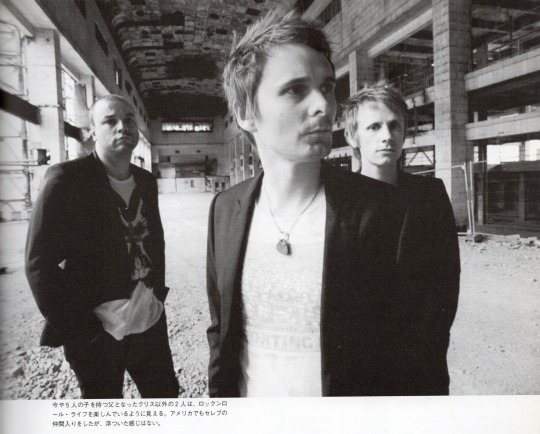
Picture: The two other members of the band, except for Chris, who is now a father of five children, seem to be enjoying the rock 'n' roll life. They have become celebrities in the U.S., but there is no sense of flirtation.
—I also think that for most rock bands, creating a three-part symphony (like “Exogenesis”) would be considered an arrogant and irreverent act of folly. But, if there is a band that can pull it off, Muse is the only band on the scene today that can do it.
Matthew: I think there has always been a slight classical element in our music. Over the years, this has become more and more prevalent, especially in concerts, where there are many people who respond favorably to the so-called “epic” songs. I think that gradually we began to think that it would be acceptable to do something a little more elaborate along those lines. However, even in that symphony, we were careful to let the emotion of the music be the star and the driving force. We didn't want to show off our technique or ability. That's why there are no solos for each part or anything like masturbation. I just wanted it to be a soundtrack to a very contemporary movie.
—Speaking of soundtracks, did you have a good experience working on the soundtrack for the Hollywood suspense film “The International”? (Ed. note: The 2009 action suspense film starring Clive Owen and Naomi Watts. Matthew is credited for the song titled “The Bank of the Fallen Colossus: End Title.)
Matthew: Yes, definitely. I did it more as a chance to get used to orchestral software than anything else. All film composers these days are writing songs using computer software for scores. Instead of writing by hand the old-fashioned way, you just have to type it out like you would type. I learned a lot about the software, and I was able to contribute ideas to the Berlin Symphony Orchestra, which was playing the soundtrack to the film at the time. That gave me a little bit of confidence, because I got to hear a live orchestra play and reproduce the melody, the parts, and the arrangement that I had created. And I started to think, if I can do this, then of course I can do it in Muse. It gave me a lot of confidence.
[About personal life and band]
—There was another new scandal recently. It is about a British tabloid newspaper that has been tapping the phones of celebrities. Have you ever been afraid that your phone might be tapped?
Matthew: I don't know, I never really thought about that. They are only interested in people whose private lives are intriguing to the general public. They're insanely famous people.. We as a band and as individuals don't expose our personal lives to the public that much. I don't think there is anyone out there who is interested in my personal life. I have no complaints about that.
"We're probably the type of band that's allowed to incorporate more theatrical elements into our gigs than other rock bands."
—What was the reaction of the other members of the band when you first told them you had decided to move to Italy?
Matthew: Well, I don't know. But the great thing is that no one really cares when I'm over there. We're so busy touring and recording all the time that when we're on our own, we all disappear like spiders scattering. Some go to Australia, some go to New York, some go to London. In my case, I'm going to Italy. It's not a big deal.
—However, the recording for the last album was done in Italy, close to your home, wasn't it?
Matthew: I had to do a lot of extra work on the album, so I asked the other members to come to Italy. It took some convincing, though. But maybe for the next album the studio will be in England.
—The latest R.E.M. album, “Accelerate,” is a very good album. They said they felt like they could be a band again with that album. On the earlier albums, they had been living in different places in the US and rarely played together anymore. Do you feel there is any danger of that?
Matthew: We still spend more time with our members than we do with our families. Groups like R.E.M. are much older than us. I think when you get to that age, you don't tour as much for a long time anymore. We tour a lot more now than R.E.M. did. If we stopped touring and slowed down, say, to tour for 6 weeks and then take a few months off, I think it would be difficult. In our case, we spend most of our time together. That's more time than I spend with my girlfriend. We spend most of our time in hotels, on tour buses, in concert halls, or in studios. If that is going to decrease, it will be more important to live in the same place.
[About the live performance]
—How is Muse going to get any bigger?
Matthew: Well, I don't know if we can get any bigger, but we can get better. That's a fascinating thought. But the scale of our concerts will definitely get bigger. It's not your average rock concert. We're going to take a cue from “1984” and build on that by playing to an audience that surrounds us. It's something more theatrical. It's not opera, but it's as close as you can get.
—Is it like U2's “360° Tour”?
Matthew: No, it's different. We have the audience behind us and in front of us. In a way, it's more like a Pink Floyd setting, like being trapped inside a building. It's a message of breaking out of the utilitarian system.
—So you want people to feel the atmosphere of “1984”?
Matthew: Exactly. It's going to be exciting.
—Are you looking forward to the three-week U.S. tour with U2?
Matthew: I think it's going to be a very simple, no-frills set. We'll be on stage in the daytime, so we won't need any lights. The tour is a great opportunity for us to get back into full-fledged live mode, and it's kind of like a rehabilitation program for us. And we get to see U2 up close and personal at night. I'll get to see how they do it. They are one of the biggest and best live acts in history. Also, it's a lot less pressure to be in the front of the lineup. You don't have to worry about video shoots, performers, and all the other stuff that goes along with being the main act, you just focus on your music. It's the perfect warm-up to get your body acclimated to the live mode.
—Muse is also known as one of the best live bands in the world, isn't it? How do you expect to top your last show in the U.K., where you played to 150,000 people at the renovated Wembley Stadium?
Matthew: I try not to think too much about going over. We look at things differently every time. But I'm sure we'll have more of those balloon-dangling-performer gimmicks. We are probably the type of band that is allowed to incorporate more theatrical elements into our gigs than other rock bands. Of course, we'll be playing a selection of new songs from the new album. What we're looking forward to is trying to recreate that symphony live. I don't know if it will work, but it will probably be a Hans Zimmer-style synth version (Ed. note: German composer and synthesizer player famous for his film scores for “The Lion King,” “Gladiator,” “Pirates of the Caribbean,” etc.).
#Matt Bellamy#Dom Howard#Chris Wolstenholme#Muse#The Resistance era#my scan#translation#interview#FINALLY done with this!#I've put lots of links to stuff that is worth listening to#seriously just listen to them all#especially Elīna Garanča's rendition of Camille Saint-Saëns' 'Mon coeur s'ouvre à ta voix'#it's tearfully beautiful#STYLE Series#STYLE Series 004
8 notes
·
View notes
Text
you're going about your normal day when, suddenly, surprise! you've been pokémon mystery dungeon'd!
unfortunately, due to budget cuts, the pokémon assigning quiz has been canceled. instead, you must spin THE WHEEL, assigning you a random, unevolved, non-legendary and non-mythical pokémon. you must now go on some sort of world-saving adventure as this pokémon. good luck!
tell me in the tags what you rolled, and how you feel about it - for bonus points, you can spin the wheel again for (or just take your pick of) a pokémon to be your partner.
bonus rules:
you're not shiny unless the wheel tells you you're shiny
take your pick of regional forms and evolutions (for example, if you roll vulpix, it's up to you whether that means normal or alolan vulpix)
apply whatever logic you like with regards to gender
have fun and be yourself!
#pokemon#pkmn#pokemon mystery dungeon#pmd#tag games#someone might've done this concept already but i had a worm in my brain you know.#i thought itd be fun to list all the unevolved pokemon... now i know there's only around 400 evolution lines total!#.. not counting mythicals legendaries ultra beasts or paradoxes#by the way! alongside the shiny result there are two other bonus results: an obligatory pikachu and... a surprise!!!#finally feel free to let me know if i misspelled something or accidentally included an evolved mon (other than pikachu)#sorry long tags ha 😅 i'm done now
22K notes
·
View notes
Text
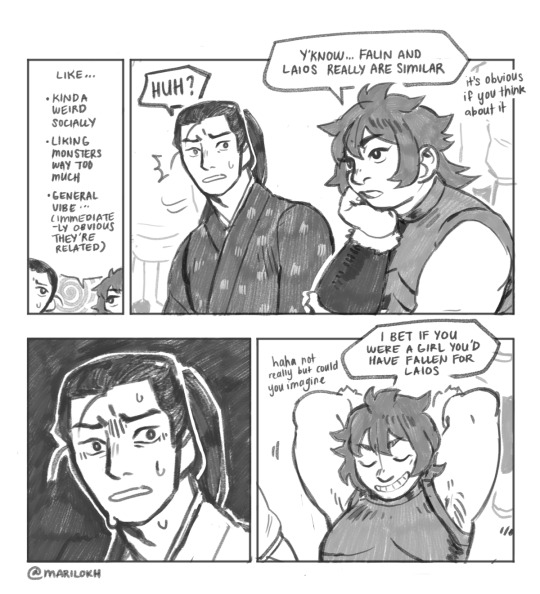
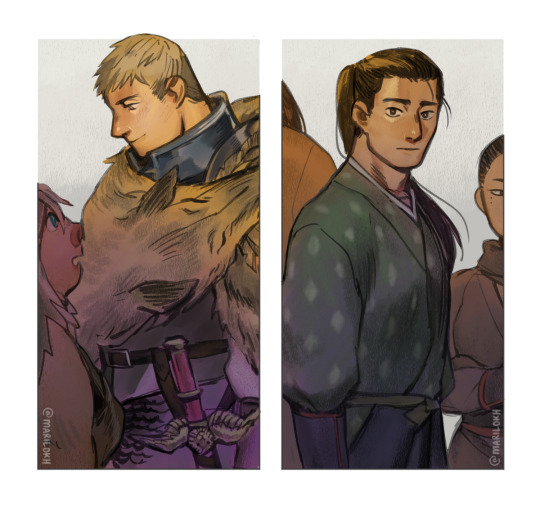
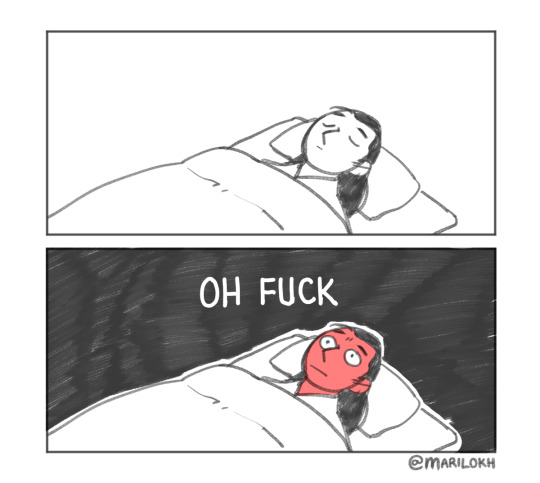
DO YOU SEE MY VISION... DO YOU SEE WHAT THEY COULD BECOME
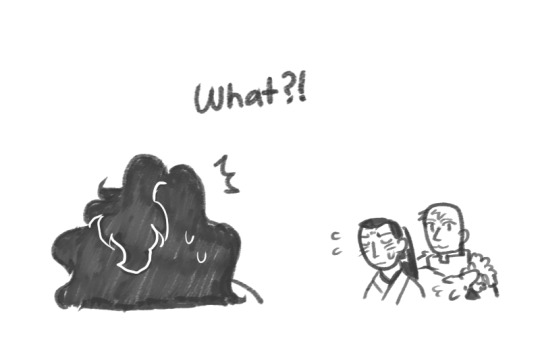
#laishuro#shuro#nakamoto toshiro#laios touden#dungeon meshi#delicious in dungeon#art#dungeon meshi spoilers#PLEASE PLEASE PLEASE PLEASE#ok. i can already see that the colors may be. Different. becos it was worked entirely on my tablet#hopefully its still ok 💀#namari#I FORGOT TO TAG NAMARI#ITS FINALLY DONE IVE HAD THE IDEA IN MY DRAFTS FOR LITERAL MONTHS
25K notes
·
View notes
Text
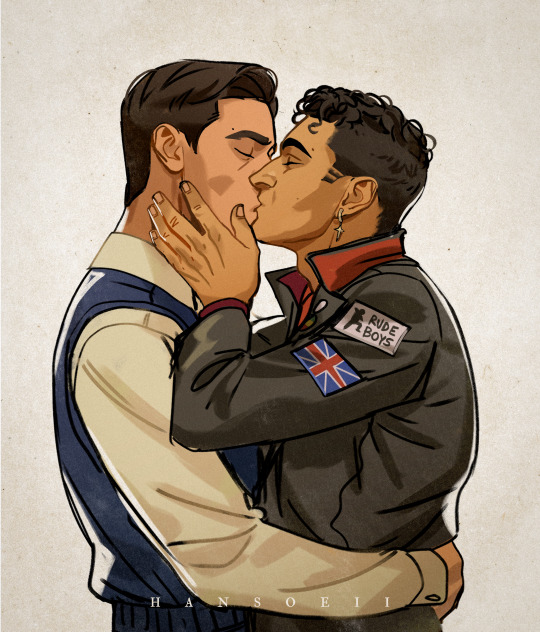
this one's for you, edwin paine
#charles said he misses kissing so I did what had to be done#these two won't leave my brain#which is bad cos I REALLY need to focus on my final#but oh well#what can I do#dead boy detectives#DBD#dead boy detectives fanart#painland fanart#chedwin#chedwin fanart#my art#digital art#fanart#my fanart
10K notes
·
View notes
Text
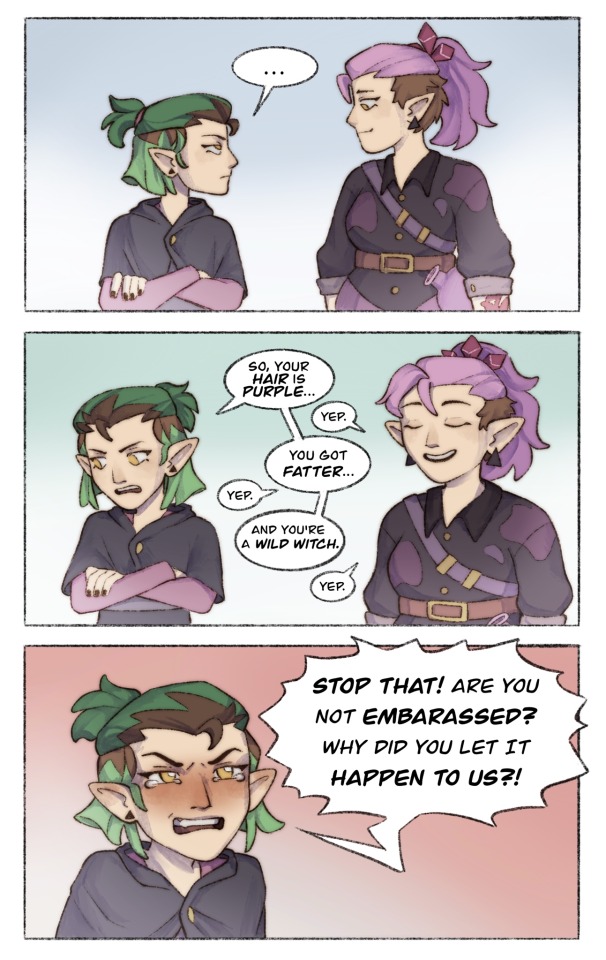
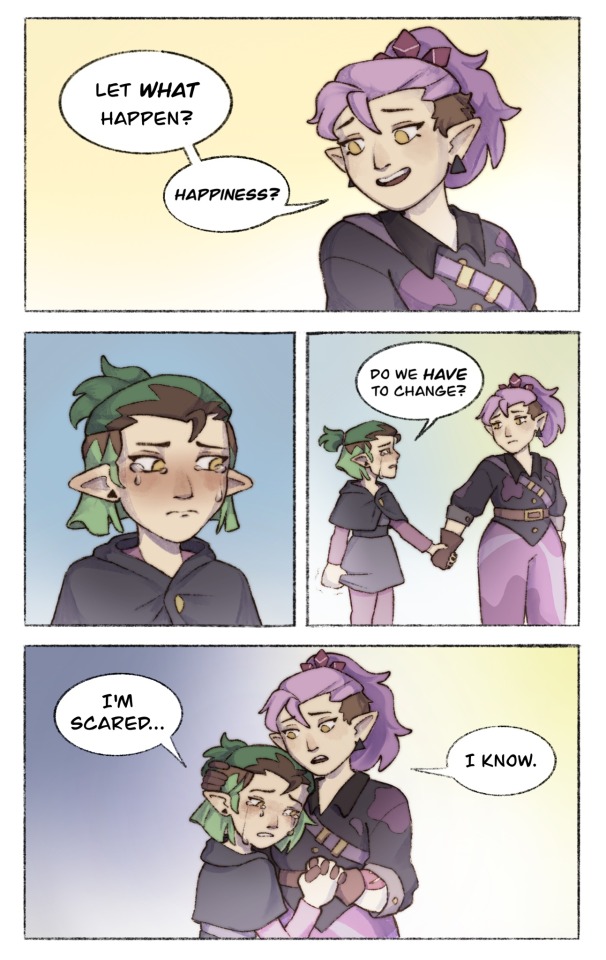
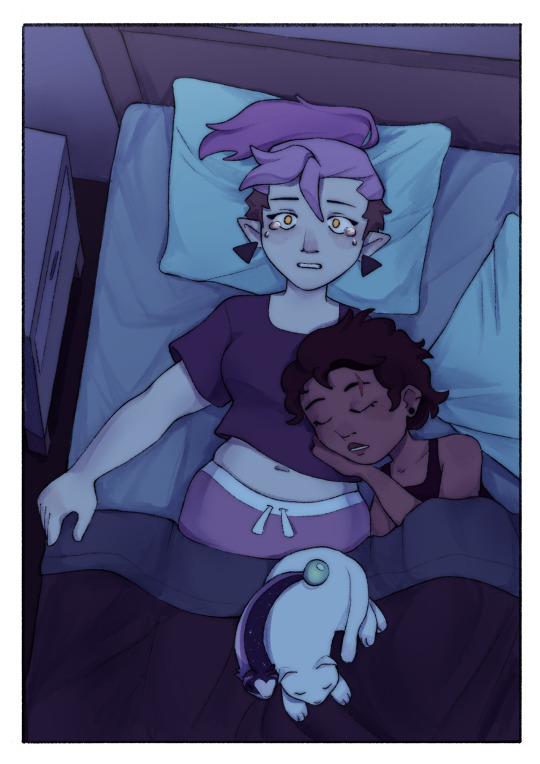
•. A visit in a dream .•
#the owl house#toh#my art#cw fatphobia#toh comic#amity blight#amity toh#toh amity#green haired amity#time skip amity#time skip Luz#luz noceda#lumity#angst#toh angst#it's finally done omg#idk why it took me so long to make this but it's a great improvement from my last comic imo
24K notes
·
View notes
Text

Félicie (Fluttershy) peeved expressions.
References from S6E11, a.k.a. the funniest episode in the series.
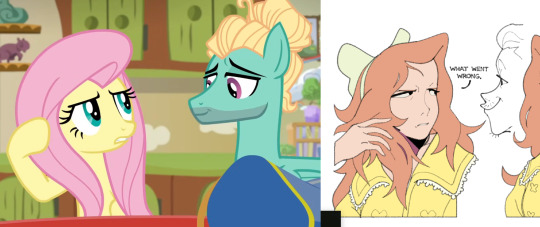
#mlp#fluttershy#the poses are pretty weak but i just wanted practice drawing her face + hair and to get back into art now that i'm done w finals#my art#fanart#character design#the grand galloping 20s
8K notes
·
View notes
Text
The image of Astarion as flamboyant Dracula was too much to ignore. So have this.
Audio from the Dracula: a Comedy of Terrors play
Nice to meet you | Baldur’s Gate 3 | Animatic
#baldurs gate 3#bg3#astarion#gale of waterdeep#wyll ravengard#animatic#animation#indigoniteart#so it is done im finally free
14K notes
·
View notes
Text



HAPPY HALLOWEEN!! i hope you get to eat a lot of candy and watch a scary movie if you celebrate :D
#idr if ive ever done a halloween themed mlb drawing#my art#miraculous#miraculous ladybug#ml#mlb#chat noir#marinette dupain cheng#marichat#halloween#happy halloween#i dressed up as ellie from tlou2 for my school's halloween party this past weekend#my hair was the perfect length :D its grown out a lot#i had a lot of fun doing that cosplay cause I just used stuff from my closet#also! it snowed today!! winter is finally here
13K notes
·
View notes
Text
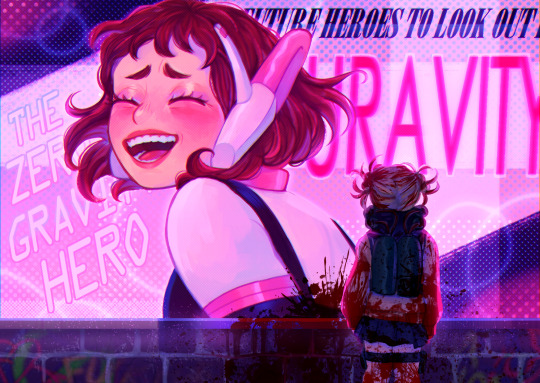
it's never over, she's the tear that hangs inside my soul forever
inspo credits to "Veil" by @/_K0TTERl_
ochako ver
#omggg she's finally done#literally my favorite ochako I've ever drawn#love these two forever and ever and ev#pour one out for jeff buckley#bnha#togachako#mha#bnha fanart#boko no hero academia#toga himiko#my hero academia#toga#togaraka#uraraka ochako#himiko toga#ochako uraraka#mine !!
7K notes
·
View notes
Text
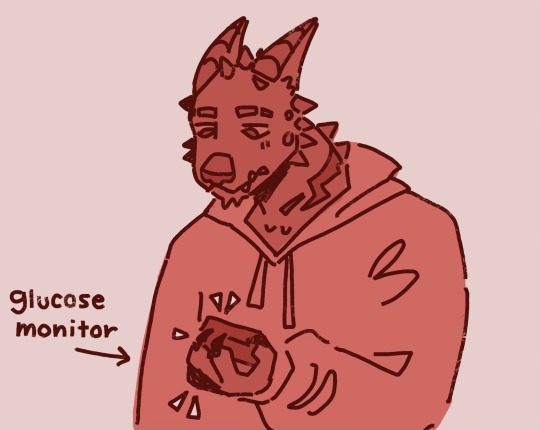
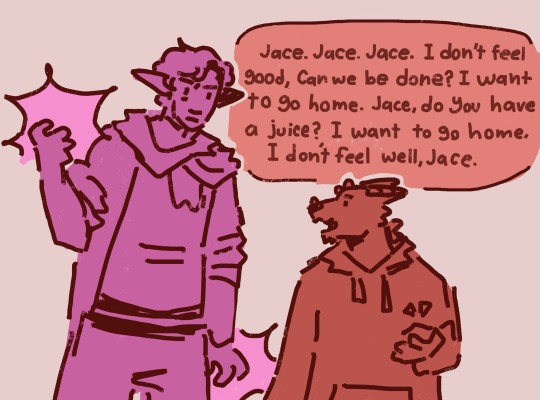
Ugh. Literally just let her go home???
#‘can we be done now?’ in the middle of the final battle is the best thing ever#I love her so much#Ruben does actually have a juice on him for this#btw#not jace though#that fucking dick.#mary ann skuttle#best character ever made#jace stardiamond#the rat grinders#d20#fantasy high#d20 fantasy high#dimension 20#d20 fanart#fh#fantasy high fanart#fhjy#d20 fhjy#fhjy spoilers#not really spoilers but like#being safe about it#fhjy fanart#fantasy high junior year#finals are kicking my ASS. this is all I’ve got.#undescribed#my art
5K notes
·
View notes
Text

[never coming out, never coming clean]
so is baron just in the briefcase now.
#riz gukgak#baron from the baronies#baron fantasy high#to be clear:#aroace riz#my aro stuff often gets misinterpreted but this is abt coming out as aspec#would’ve rather done this concept more justice but its finals#d20 fantasy high#fhjy#fhjy spoilers#dimension 20#d20#fanart#digital art#drawing
6K notes
·
View notes
Text
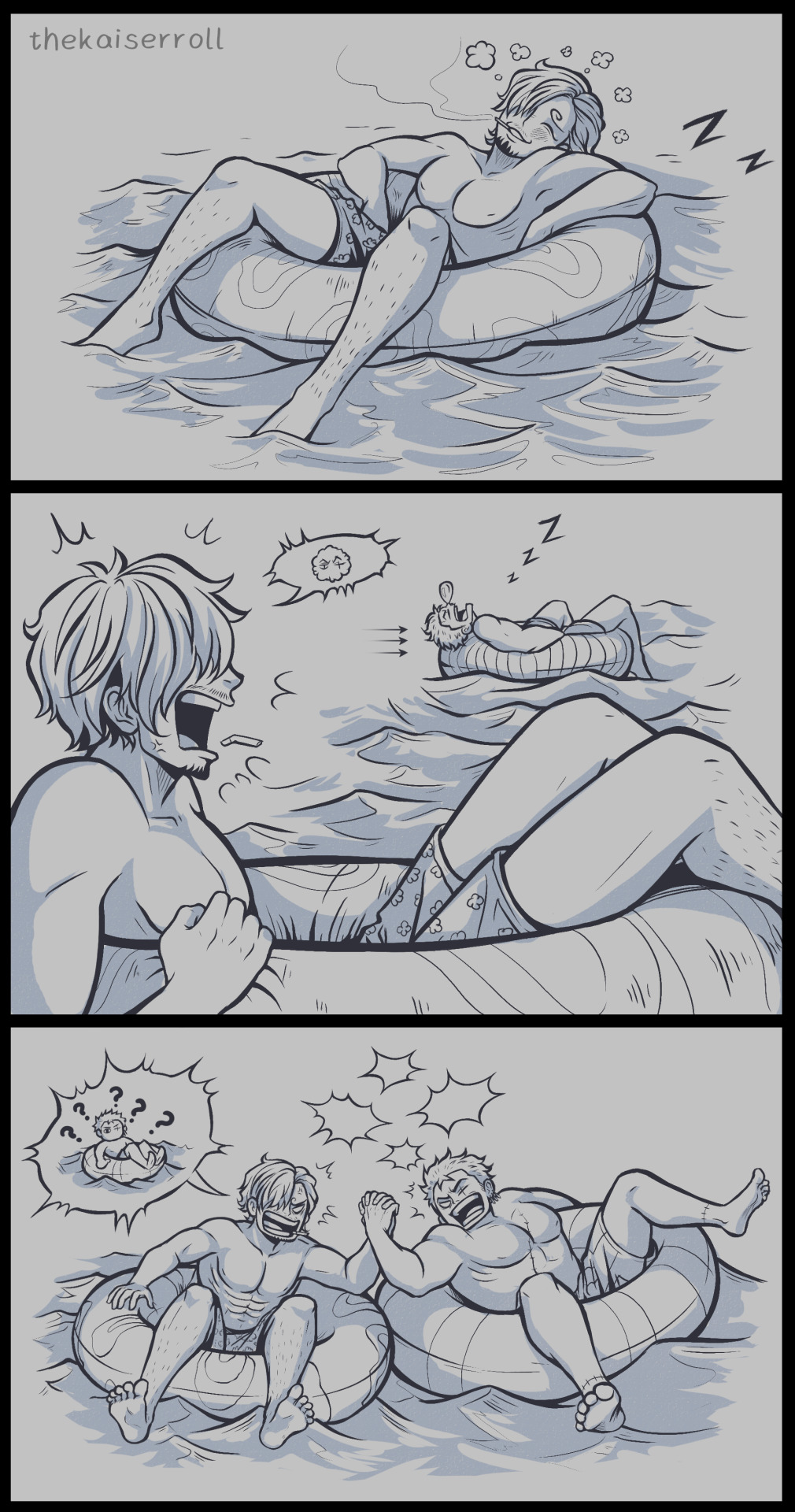
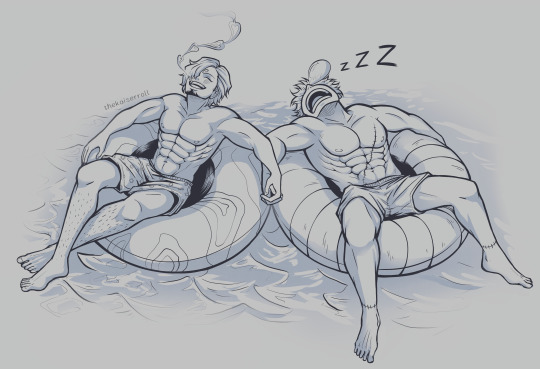
Zosan comic inspired by videos of otters holding hands so they won't float away from each other.
#roronoa zoro#sanji#black leg sanji#zosan#zoro x sanji#one piece#I have finally finished it!#I posted a rough sketch of this on discord server about 9 months ago and then I just abandoned it ;-;#this psd file has been staring at me for so long and now this comic is finally done!!!#I'm so happy but also now I know I can't post my WIPs because that's what happens to them XD
6K notes
·
View notes
Text
REPLICA PLAYLIST
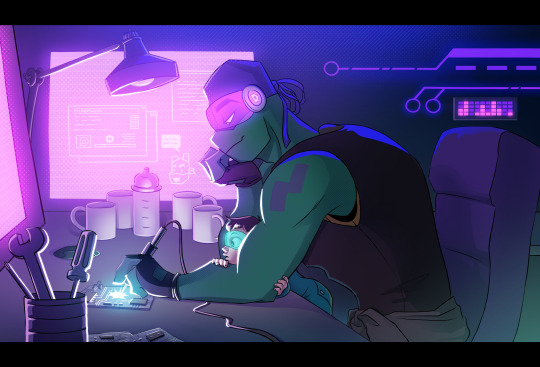
MUSIC UNDER CUT
I have been receiving requests for any songs that inspired Replica, so here, have my personal playlist. Sorry it’s not Spotify/Soundcloud but they don’t have some of these songs available so uh… guess you’re stuck with YouTube vids. For fun I'll include my personal titles for them (which might give a few hints of what to expect in the future/end).
Replica Main Theme - “Die for You” by Grabbitz
Like Father Like Son Like Brother (Omega and Shelldon) - "As Above So Below" by Alistair Lindsay
Mikey's Theme / The 1st Vision - "Suzume no Tojimari" by Nanoka Hara
Military (Mad) Dogs / Central Park Colony - "Imperium" by Madeon
Shanghai - "Icarus" by Madeon
Boom Goes the Donnie-mite (Mikey/Donnie vs the Sweeper) - "The Red Zone" by Mitsuoto Suzuki
The Day the Sky Bled Red - "7 Seconds Till the End" by Nobuo Uematsu
Going Out Like a Boss (Raph and Leo) - "Agape" by Nicholas Britell
Remembering the Right Way (Mikey and Leo) - "The Souls of Many" - by Alistair Lindsay
Mystic Hands / The 2nd Vision - "Am I Dreaming" by Metro Boomin x A$AP
Book 2 Trailer - "Sea Dragon" by Covet
7 Years Later - "Iron" by Woodkid
Leo's Theme / Attack on the Labor Camp - "Ego Death" by Polyphia
Omega's Theme - "Touch" by Daft Punk
Flat Lines (Omega Alone) - "Die Toteninsel Emptiness" by 1000 Eyes
Spear - "Monsters" by Tommee Profitt
Final Protocol - "The Kraken" by Katie Dey
Rise / Epilogue - "Close in the Distance" by Masayoshi Soken & Tom Mills
I will admit, it's a little embarrassing since you can easily see the patterns of what I've been listening to for the past year or two. I swear I listen to more than just videogame OSTs, these songs just jive well with the story and I often find lyrics distracting when brainstorming scenes. Regardless, the music I listen to is such an important part of my creative process and some of these songs really defined the scenes I now have locked in my head. So I figured it was only fair to give them the credit they're due.
I will continue to add to this playlist, and will note in comic updates when one of these songs is applicable!
#lofi Donnie anyone?#also sort of celebration for 19k followers wow#should I do something else for it?#I particularly like Leo's theme being titled Ego Death#very fitting#Also the final song makes me cry because the lyrics are just too dang perfect#I'd like to do an animatic with the song when this story is all done#check out the lyrics if you get the chance#in fact I'd like to do an animatic trailer for the Book 2 Teaser#we'll see though#i can't allow myself to get too distracted from the comic itself haha#replica#rottmnt replica#kathaynesart#playlist#music#spoilers? but like... you know how it ends in the movie so not really?#kind of?#did you see the rise movie?#then you’ve been spoiled sorry#posting again at an ungodly hour#I am tired#save rottmnt#rottmnt#TMNT#Donatello#casey jones
4K notes
·
View notes
Text
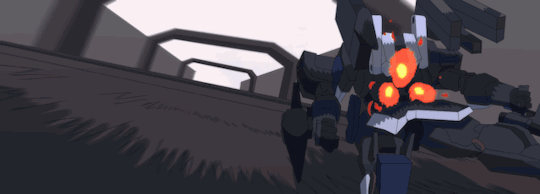
chasing clouds over rubicon
#rusty ac6#v.iv rusty#ac6#armored core#steel haze ortus#animation#2d animation#it’s finally done#thank god#my art <3
6K notes
·
View notes
Text
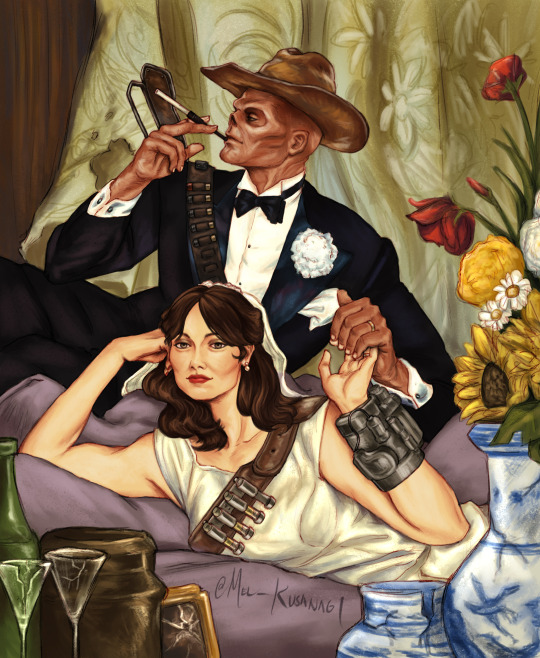
mr. radiation king and mrs. atomic queen 🤵👰
inspired by this j frederick smith painting/illustration:
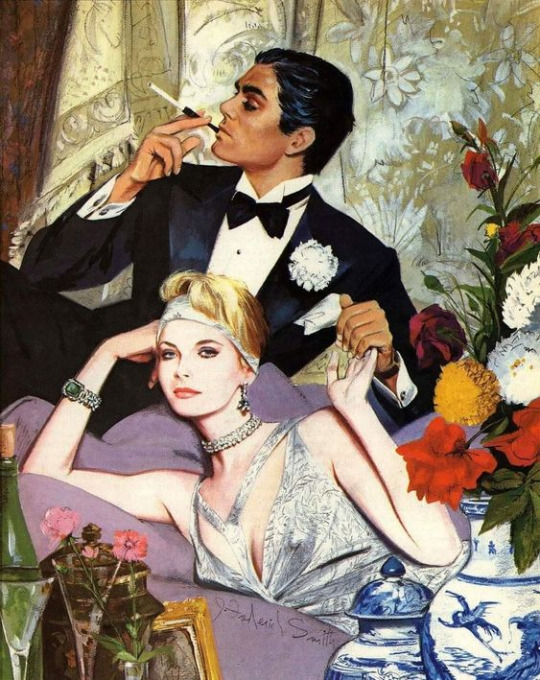
#FINALLY it is done#actually proud of this ngl#anyways here's what you've all been waiting for and it's all finished! i hope you like it!#lucy maclean#cooper howard#the ghoul#ghoulcy#vaultghoul#fallout#fallout prime#my art
3K notes
·
View notes